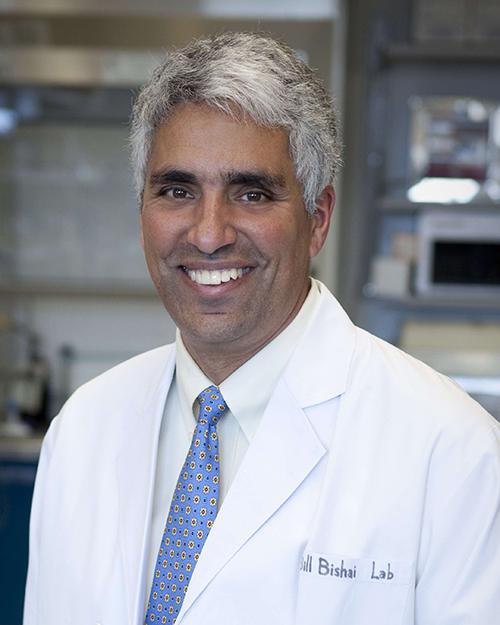Research Lab Results
-
Philip Wong Lab
The Philip Wong Lab seeks to understand the molecular mechanisms and identification of new therapeutic targets of neurodegenerative diseases, particularly Alzheimer's disease (AD) and amyotrophic lateral sclerosis (ALS). Taking advantage of discoveries of genes linked to these diseases (mutant APP and PS in familial AD and mutant SOD1, dynactin p150glued ALS4and ALS2 in familial ALS), our laboratory is taking a molecular/cellular approach, including transgenic, gene targeting and RNAi strategies in mice, to develop models that facilitate our understanding of pathogenesis of disease and the identification and validation of novel targets for mechanism-based therapeutics. Significantly, these mouse models are instrumental for study of disease mechanisms, as well as for design and testing of therapeutic strategies for AD and ALS. -
Joseph Mankowski Lab
The Joseph Mankowski Lab studies the immunopathogenesis of HIV infection using the SIV/macaque model. Our researchers use a multidisciplinary approach to dissect the mechanism underlying HIV-induced nervous system and cardiac diseases. Additionally, we study the role that host genetics play in HIV-associated cognitive disorders.
Principal Investigator
Department
-
James Hamilton Lab
The main research interests of the James Hamilton Lab are the molecular pathogenesis of hepatocellular carcinoma and the development of molecular markers to help diagnose and manage cancer of the liver. In addition, we are investigating biomarkers for early diagnosis, prognosis and response to various treatment modalities. Results of this study will provide a molecular classification of HCC and allow us to identify targets for chemoprevention and treatment. Specifically, we extract genomic DNA and total RNA from liver tissues and use this genetic material for methylation-specific PCR (MSP), cDNA microarray, microRNA microarray and genomic DNA methylation array experiments.
-
Brendan Cormack Laboratory
The Brendan Cormack Laboratory studies fungal pathogenesis, particularly the host-pathogen interaction for the yeast pathogen Candida glabrata. We are trying to identify virulence genes (genes that evolved in response to the host environment) by screening transposon mutants of C. glabrata for mutants that are specifically altered in adherence to epithelial cells, in survival in the presence of macrophages and PMNs. We also screen mutants directly in mice for those unable to colonize or persist in the normal target organs (liver, kidney and spleen). We also focus research on a family of genes--the EPA genes--that allow the organism to bind to host cells. Our research shows that a subset of them are able to mediate adherence to host epithelial cells. We are trying to understand the contribution of this family to virulence in C. glabrata by figuring out what the ligand specificity is of different family members, how genes are normally regulated during infection, and what mechanisms normally act to keep the genes transcriptionally silent and how that silence is regulated.
-
Bert Vogelstein Laboratory
The Bert Vogelstein Laboratory seeks to develop new approaches to the prevention or treatment of cancers through a better understanding of the genes and pathways underlying their pathogenesis. Our major focus is on cancers of the colon and rectum. We have shown that each colon neoplasm arises from a clonal expansion of one transformed cell. This expansion gives rise to a small benign colon tumor (called a polyp or adenoma). This clonal expansion and subsequent growth of the tumors appears to be caused by mutations in oncogenes and tumor suppressor genes, and the whole process is accelerated by defects in genes required for maintaining genetic instability. Mutations in four or five such genes are required for a malignant tumor to form, while fewer mutations suffice for benign tumorigenesis. As the mutations accumulate, the tumors become progressively more dangerous. Current studies are aimed at the further characterization of the mechanisms through which these genes act, the identification of other genes that play a role in this tumor type, and the application of this knowledge to patient management. -
David Graham Lab
The David Graham Lab studies the consequences of HIV interactions with the immune system, the resulting pathogenesis and how to sabotage these interactions. We apply advanced technologies like mass spectrometry to dissect processes at the molecular level. We are also actively involved in cardiovascular research and studies the ways proteins are organized into functional units in different cell types of the heart. Major projects in our lab are organized into three major areas: (1) H/SIV pathogenesis and neuropathogenesis, (2) Cardiovascular disease, and (3) High technology development -
William Bishai Laboratory
The William Bishai Laboratory studies the molecular pathogenesis of tuberculosis. The overall goal of our laboratory is to better understand tuberculosis pathogenesis and then to employ this understanding toward improved drugs, vaccines and diagnostics. Since Mycobacterium tuberculosis senses and adapts to a wide array of conditions during the disease process, it is clear that the regulation of expression of virulence factors plays an important role in pathogenesis. As a result, a theme of our research is to assess mycobacterial genes important in gene regulation. We are also interested in cell division in mycobacteria and the pathogenesis of caseation and cavitation. -
IBD and Autoimmune Liver Diseases Laboratory
Investigators in the IBD and Autoimmune Liver Diseases Laboratory conduct basic and translational research in inflammatory bowel disease (IBD) and autoimmune liver diseases. One area of focus is discovering and developing biomarkers for diagnosing and prognosticating IBD and other autoimmune liver diseases (AILDs). We also are exploring the molecular pathogenesis of—and developing novel therapies for—IBD. In addition, we are working to understand the molecular reason why many IBD patients fail to respond to mainstay drug therapies—and to develop diagnostic assays that can predict non-responders before starting them on those therapies. These biomarker studies have led to our application for four U.S. and international patents.
-
Thomas Quinn Lab
Research in the Thomas Quinn Lab encompasses epidemiology, pathogenesis and clinical features of HIV/AIDS internationally, which includes the interaction between STDs and tropical diseases on the natural history and spread of HIV/AIDS in developing countries. Our recent research has examined the viral kinetics and transmission probabilities of HIV among discordant couples with the subsequent design and application of interventions, including therapy to prevent transmission of HIV. Molecular studies have mapped the molecular epidemic of HIV on a global basis, linking virologic changes to the spread of HIV and measuring the demographic impact of the epidemic.
-
Ted Dawson Laboratory
The Ted Dawson Laboratory uses genetic, cell biological and biochemical approaches to explore the pathogenesis of Parkinson's disease (PD) and other neurologic disorders. We also investigate several discrete mechanisms involved in cell death, including the role of nitric oxide as an endogenous messenger, the function of poly (ADP-ribose) polymerase-1 and apoptosis inducing factor in cell death, and how endogenous cell survival mechanisms protect neurons from death.




